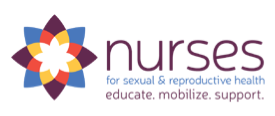2023 KE Award Recipient Stephany Graham (she/her)
Each year, NSRH gives out the Karen Edlund Future Leader Award to exemplary students who are advocates and leaders in sexual and reproductive health and justice. This award honors the life and legacy of Karen Edlund (RN, BSN), a public health nurse and lifelong advocate for sexual and reproductive health. Karen served as the Director of the SRH Program at the Massachusetts Department of Public Health for 23 years, from 1992 until her retirement in May 2015. During her tenure she developed and managed several critical initiatives that have been key to ensuring access to comprehensive SRH services for the people of Massachusetts. In addition to her leadership with the MA Department of Health, she also played an important leadership role with several other organizations. Karen served on several boards, including our very own.
Like Karen, Stephany is dedicated to advancing sexual and reproductive health, equity, and justice. She’s especially committed to improving maternal health outcomes for Black women. As a doula, public health graduate, nursing student, and aspiring midwife, Stephany is well positioned to empower her patients while advocating for broader systemic changes in health systems. Congratulations Stephany!
Learn more about Stephany below.

I am a first-year Master of Nursing Student at Vanderbilt University School of Nursing. I graduated with my Bachelor’s in Business Administration from Georgia State in 2019. I have always been very passionate about maternal and reproductive health, which resulted in me pursuing my master's in 2020. I received my MSPH from Meharry Medical College in 2022. Outside of school, I serve as a birth and postpartum doula, with the organization Homeland Heart. I feel that my past experiences solely cultivated my desire for nursing, reproductive health justice, and women’s health. Which is why I aspire to become a Certified Nurse-Midwife.
What inspired you to work in sexual and reproductive health?
I was inspired to work in sexual and reproductive health after becoming a community health doula. What drove me to pursue my first master's in public health was the racial injustices that black women face. After working with black and brown women in the birthing space, I knew that direct patient care was for me. Transitioning to direct patient care through nursing allows me to make an immediate and significant impact. As a nurse, I can provide compassionate, culturally competent care to patients while using my background in public health to advocate for larger systemic changes.
What achievements are you most proud of?
I am most proud of getting into this prestigious nursing program. Vanderbilt has a strong reputation for preparing highly skilled nurses who excel in their fields. The opportunity will allow me to be trained and guided by some of the best professionals in the industry, providing me with a firm foundation for my future career. Education is not only about academics but also experiences, building relationships and personal growth. I have already seen the significant difference VUSN has made in my personal and professional growth.
Within SRH, which advocacy issues are most important to you?
What is most important to me is the racial disparities in maternal mortality. Black women are two to three times more likely to die from pregnancy-related causes than white women in the United States. Nurses play a critical role in advocating for and implementing change. As a future nurse and hopefully nurse-midwife, I plan to directly contribute to improving outcomes for black mothers.
When you think about your future in nursing, what does it look like?
After graduation, I plan on working as a registered nurse in labor and delivery. In the future, I hope to one day become a nurse-midwife. Both of these positions play a crucial role in bringing new life into the world and providing essential care to mothers and babies. As a future nurse and Nurse-Midwife, I will have the opportunity to truly make a difference in a woman’s quality of life and be able to assess and treat them while doing so. This will allow me the opportunity to effectively prevent adverse health outcomes, manage/treat health issues, and birth healthy babies. My desired patient population is minority pregnant women of color. My personal experiences as a black woman in reproductive health has shaped my perspective on health equity. I will continue my areas of expertise to eliminate the disparities that we see in maternal and fetal health.
What does leadership in nursing mean to you?
To me, leadership in nursing means advocating for patients, their team, and the nursing profession as a whole. This may involve standing up for patient rights, promoting ethical practices, or lobbying for policy changes to address healthcare disparities. Overall, I believe that nurse leadership is about pushing boundaries. The healthcare environment is continually evolving, and nurse leaders must often challenge existing practices and ideas to improve patient care and outcomes.
What do you enjoy doing outside of work? Any hobbies, or things you like doing in your free time?
Outside of nursing school, I enjoy doing anything that brings me joy. This includes reading, journaling, hiking, cooking, and spending time with friends.
What motivates you? Or what do you find healing?
What motivates me most is my family and friends. I have a great support system around me that is there for me in times of need. Having positive influence and encouragement from my loved ones provides a driving force toward achieving my goals. I find healing in spending time in nature and practicing yoga.
